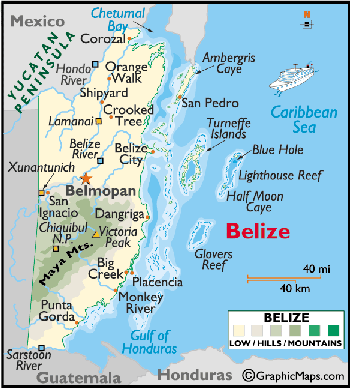
| Location: | Capital City Belmopan
(52,000) 16º 13' N, 88º 48' W |
| Population: | 287,730 |
| Area: | (land) 8,805 sq miles (22,806 sq km)   (water) 62 sq miles (160 sq km)
(water) 62 sq miles (160 sq km)   (TOTAL) 8,867 sq miles (22,966 sq km)
(TOTAL) 8,867 sq miles (22,966 sq km) |
| Climate: |
consistently warm and humid tropical
weather with pronounced wet and dry seasons. The rainy season runs (June
- December) and the dry season from (January - May). Rainfall is
heaviest in the coastal areas of the far south.  Average high temperatures in the coastal regions reach into the mid 70s throughout most of the year, and a bit higher inland. Much higher temperatures in the offshore islands are commonplace, with cooler conditions the norm in the mountains of the south.  Belize is occasionally has hurricane season |
| Elevation: | Highest Pt. Victoria Peak
- 3,805 ft. (1,160 m) |
Belize
Cardiothoracic Surgery in Belize
Feasibility Study
Belize is an independent country in Central America. The population is over 300,000 of mixed origin, including native Indian, Spanish, and African. The country is divided into six regions (Corozal, Orange Walk, Belize City, Cayo, Stan Creek, and Toledo). The major economy is tourism. The official language is English, but Spanish and Creole is widely spoken. At present CT surgery is not available in the country. Tertiary health care is available in Belize City. There is one government/public hospital in Belize City: Karl Huesner Memorial Hospital Authority. There are 6 regional or district hospitals (Corozal, Dangriga, La Loma Lu Cayo, Orange Walk, Punta Gorda, and San Ignacio). Funding is government with independent hospital control of the expenditures. It has >100 ward beds, 3OR’s, 2 OB delivery rooms, and a 6 bed ICU. The hospital staff is well trained with general surgery, Ob/Gyn, urology, ENT, Orthopedic, and now CT and Neurosurgery capability. There are 2 cardiologists, 3 anesthesiologists, 6 nurse anesthetists, and 2 Intensivists. There is a renal dialysis unit in place. This program is monitored by a renal doctor in Salem, MA, USA. A mobile cath. lab. has been donated, and will be installed or attached to the hospital within the year. The hospital is committed to initiating services in CT surgery, including a phased approach to thoracic, adult cardiac, and non-complex pediatric cardiac surgery. There are 2 private clinics: Belize Health Care Partners and Belize Medical Associates. They provide excellent care and services, including cardiology (Dr. John Goff). Many of the public hospital physicians supplement their income (20% government salary) working in the private clinics.
Adrian Coye MD is a well trained CT surgeon (Jamaica and UK) that has returned from Jamaica to his native Belize to initiate the CT surgery program. He is employed full time, and supported in this effort by the government hospital.
The hospital infrastructure is adequate with no UPS, water, sanitation, ventilation, or access issues. Security is well maintained. The hospital is the major trauma center. All medical records are computerized. The hospital does need maintenance, repairs, and expansion, especially for OB/Gyn.
There is a need for additional equipment in the OR and ICU. This includes:
- Multiparameter monitor x2 with EtCO2 capability
- Heater/cooler for cardiac bypass machine
- ACT machine or Hemocron unit to monitor heparin
- Defibrillator with int. and ext. paddles
- C-arm fluoroscopy
- Intra-aortic balloon machine
- Blood gas analyzer
- Cardiac surgery instruments, including sternal saw
- Temporary cardiac pacemaker x2
- Essential drugs needed include: Milrinone, Amiodarone, Epinephrine, Norepinephrine, Vasopressin, and PGE1. Other needed drugs are locally available via distributors.
The hospital staff needs include: a trained cardiac Perfusionist, as well as additional training for the local anesthesiologists, Intensivists, cardiologists, and nurses (OR, ICU, Ward, and Out patient clinic).
The hospital administration is well organized and coordinated. Bernard Bulwar MD, a cardiologist is the chief of medical services. He is also an expert on ECHO technology. Hospital care is free, but special needs must be paid for, including drugs, and disposables, valves, etc. that are required for open-heart surgery.
The open-heart cardiac surgery project is projected in 3 stages: initiation of general thoracic surgery, then adult cardiac, and finally non-complex congenital heart surgery. An outreach program is being planned to screen the population for cardiac disease, especially coronary, rheumatic, and congenital heart disease. The anticipated annual caseload is projected at 100-150/year.
The following recommendations were made:
- Establish a steering committee to coordinate the project.
- Complete infrastructure repairs and additions.
- Obtain remaining equipment needed.
- Develop cooperation with local distributors to obtain disposables, drugs, etc. at discounted prices.
- Development of database for patients waiting or needing CT medical, interventional, or surgical care.
- Solicit cooperation and MOU’s with foreign centers, NGO’s, and individuals to assist.
- The MOU should include guidelines for airfaire, housing, meals, local transportation, donated equipment/supplies, credentialing, malpractice, case complexity, education/training goals, and length of cooperation.
- Initially, foreign teams will be required at 6 month intervals to supplement the local staff, while they increase and gain experience/confidence.
- Have a Public Health office at the hospital to help develop preventive health programs for rheumatic fever, hypertension, and pre-natal care.
Summary
Belize can support a CT Surgery program, assuming that the hospital captures the majority of cases. There are no official numbers re. incidence and prevalence. My concerns remain the small annual caseload, and financial sustainability.